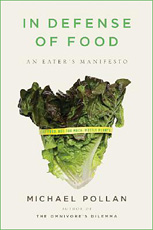In this follow-up to The Omnivore's Dilemma based on his essay in New York Times where he is a contributing editor, Michael Pollan begins with the advice: "Eat food. Not too much. Mostly plants." He goes on to state that most of us no longer eat what our mothers ate as children and what our mothers fed us as children. Instead we follow the edicts of the $32 billion dollar industry he calls the "Nutritional Industrial Complex" comprised of scientists and food marketers who have replaced good old fashioned food with "nutrients." The result is a pitch for vitamin-enriched Diet Coke and a society that is both sick and fat. Pollan sees things very differently:
"We forget that, historically, people have eaten for a great many reasons other than biological necessity. Food is also about pleasure, about community, about family and spirituality, about our relationship to the natural world, and about expressing our identity."
Pollan's aim in this manifesto is to help us reclaim our health and happiness as eaters.
Exploring "The Age of Nutrition," the author covers the philosophy that food is mostly about promoting physical health which has resulted in wars between protein and carbs and between fats and carbs. Fish, beef, and chicken are regarded merely as delivery systems for these nutrients. Pollan believes that the result of this emphasis has seen an epidemic of obesity and diabetes. The other result is that nearly everyone feels bad about their food choices, buying into the preaching of nutrition scientists who say, bad things happen to people who eat bad things.
Since this is not an abstract work, Pollan has plenty of suggestions about food and eating that he posits as a counter to the Western diet and the diseases of civilization:
• "Don't eat things that your great-grandmother wouldn't recognize."
• "Avoid food products that make health claims."
• "Get out of the supermarket whenever possible."
• "Eat well-grown food from healthy soils."
• "Pay more, eat less."
• "Do all your eating at a table."
The last suggestion fits right in with the author's spiritual take on eating as having a communal and convivial meaning and not just a medicinal value. That's why he suggests eating slowly and savoring the pleasures of the palate. In Defense of Food takes its place beside Barbara Kingsolver's Animal, Vegetable, Miracle and Eric Schlosser's Fast Food Nation as a thought-provoking book on the meanings and values placed on food in America.
